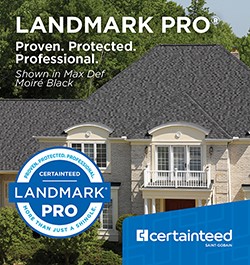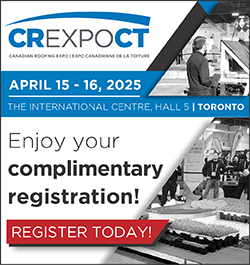Luciano Perez - IRE Focuses on Latino Culture - PODCAST TRANSCRIPTION
February 27, 2023 at 1:32 p.m.Editor's note: The following is the transcript of an live interview with Luciano Perez from KPost Roofing. You can read the interview below or listen to the podcast.
Introduction: Welcome to Roofing Road Trips with Heidi. Explore the roofing industry through the eyes of a long-term professional within the trade. Listen for insights, interviews, and exciting news in the roofing industry today.
Heidi Ellsworth: Hello, and welcome to another Roofing Road Trips, for Roofer's Coffee Shop. This is Heidi Ellsworth, and I am here today with a very special guest. I'm road tripping down to Dallas, Texas to visit with Luciano Perez, who I just saw at the RCAT/MRCA show. Good morning, Luciano.
Luciano Perez: Good morning, Heidi.
Heidi Ellsworth: Thank you so much for being on the show today.
Luciano Perez: Thanks for the invitation.
Heidi Ellsworth: Yeah. This Roofing Road Trip is really going to be a precursor to talking about what's going to be happening at the International Roofing Expo coming up next March, 2023. You are key to really providing, I think, some of the most important continuing education, overall cultural messaging. I just wanted today to talk about your class, the panel that you're going to do. Before we do that, why don't you start out with an introduction. If you could introduce yourself, tell us a little bit about you, that would be awesome.
Luciano Perez: Well, yes. I heard you mention, my name is Luciano Perez, and I'm a state manager here with K Post Company located in Dallas, Texas.
Heidi Ellsworth: Excellent. How long have you been with K Post?
Luciano Perez: I've been with K Post since day one, part of the first 11 employees. In this next couple of months, I will be having my 19th anniversary.
Heidi Ellsworth: That's amazing.
Luciano Perez: Almost 19 years.
Heidi Ellsworth: Wow. What a great company. I've been so lucky to work with Jane, and Steve Little, and a number of... Keith Post, all of the folks there. What an awesome company, and to know you've been there 19 years. That's pretty impressive.
Luciano Perez: Yeah, yeah. We are very excited to have almost 19 years, and I move forward from here, as you can see, now that [inaudible 00:02:14]. Jane is stealing Keith [inaudible 00:02:17]. It's just been very excited through all these years.
Heidi Ellsworth: I love it. I love it. Well, so at the IRE show, which is going to be in Dallas, Texas, you're going to be doing a class and it's going to be actually a panel discussion conversation on the challenges and opportunities when dealing with safety and the Latino workforce. Such an important topic. Can you tell us a little bit about that panel? Who's going to be on it? What is it all going to be about?
Luciano Perez: Yes, Heidi. The panelists, I would have about five panelists in the group. First of all, this is the first time that we're going to do this at the IRA event. Something related to Latino, and something related to leadership, and also safety. Not just the OSHA stuff, but just leadership, and safety, and culture. It's going to be a combination of pretty interesting... I'm going to have a safety director, safety people that in from the industry, from these different areas of regions of the United States. The idea is to have an open discussion and a Q&A also from the audience. I will be moderating the session, and ask them obviously key specific questions so the panelists can share with us their insights, and how they know the struggles, the challenges. Challenges, and also the opportunities. What's working? What's not working? Things like that.
Heidi Ellsworth: Well, and when you're talking, I mean, obviously language is the first challenge. I mean, we're a dual language society, but we don't have everything in Spanish to make it easy or easier. What are some of the things you're seeing... I mean, 19 years with K Post, how much has it changed for you in having more access to good communication to literature, and safety in Spanish, Spanish toolbox talks? How has that changed, and how does that need to continue to change?
Luciano Perez: Well, at the beginning, I mean 19 years ago, 20 years ago, it was not... We didn't have a lot of material obviously, in Spanish. We didn't have trainers that obviously speak our language. It was just, "Sign the paper, and you receive this certificate, and you're off." Lately, I think the last probably 12 years or so, at least here in Texas, [inaudible 00:05:00] is saying that it's been a change. We have more trainers and more material also in Spanish for the Spanish community. It's been moving slowly in the right direction, but we need to also do more.
Heidi Ellsworth: Yeah. I mean, you and I have talked a little bit before, but really, bottom line, communication and empowerment, strong leadership and management. What are you seeing as some of the trends of that changing?
Luciano Perez: That one, I think we need to do a better job as far as, like I mentioned in our previous conversation, maybe that we promote people either from within, from outside, from other companies, to the level of [inaudible 00:05:49] or even superintendent. What we need to do, I think, in my opinion, is to do providing more than soft skills, or to teach them the soft skills, the communication skills, the listening skills. How to deal with people in that area. They already know the installation of the torch apply system, or the single apply system. They already know that. What we need to do more, is to teach them the leadership skills that they need so they can do the job better.
Heidi Ellsworth: Right.
Luciano Perez: It is been the same in the industry, in the construction. I tell them and tell them, and it seems that they don't listen. Well, in any language, it just, why they don't listen? I just, I tell them and tell them to use the harness, to put safety glasses on. As we need to empower, as you mentioned, and that's part of the... That's a three key. That's more tricks that we need to use to influence our worker to persuade, to sell the idea of safety for in this case.
Heidi Ellsworth: Yeah. You're right. I mean, it needs to be part of the culture, which I know at the companies that you're talking about, obviously K Post and these other big companies, safety is part of the culture. If it's not part of the culture where people can understand it, that it's not communicated the right way, or it's not even mentored at that leadership level, then you can talk all you want, but things won't change.
Luciano Perez: Correct. You're right. I mean, I think we use too much of a manager, the manager title position, and we use less leadership. What I mean is, so I'm going to say something from the manager perspective. Heidi, make sure you use your harness when you work on the edge, because that's the policy, and that's what the OSHA says. Use your harness, because that's the law. That's the manager. What we need, is the leader to say, "Heidi, we need you to put your harness on, because we don't want you to fall. Do you have kids?" You say, "Yes." [inaudible 00:08:18]. "Okay, well, we want you to go home at the end of the day."
Heidi Ellsworth: Right.
Luciano Perez: "I want you to use a harness when you work at the edge." That's the leader talking.
Heidi Ellsworth: Exactly.
Luciano Perez: The manager from the manager perspective, that's what the law, what the policy says, but we need to shift. That's what we miss. The [inaudible 00:08:37] are not connected. We use too much of the manager and not the leader. We need to do the other one. We need to go to the emotion of the person. Why do you think it's important for you to use your safety glasses, for instance? Well, then the guy, the person, may say, "Well, because I don't want to get on my guys," or something. That's how we need to approach [inaudible 00:09:08].
Heidi Ellsworth: Yeah. Everyone understands family, and going home to family, and the sacredness of family. Really taking the time to communicate, to show that this is about your health, your family, going home every night. I think that goes across all cultures. That just needs to be part of it. Especially, I think when you're already having communication issues, you really have to have someone who can explain that.
Luciano Perez: It's getting worse. Yeah.
Heidi Ellsworth: Yeah.
Luciano Perez: Yeah. If I say, "You just set your harness, and because you have family that depend on you," but I go beyond that, says, "Heidi," and I go, "I do this. It is important [inaudible 00:09:56]. What do you do on the weekend?" "Kids." I go trying to know you more, and then you going to say, "Yeah, this guy care about me."
Heidi Ellsworth: Exactly.
Luciano Perez: More genuine. That's more probably hard.
Heidi Ellsworth: Yes.
Luciano Perez: Yeah. I mean, I can rest preach from memory cheesy words and phrases, but no, I need to do like this.
Heidi Ellsworth: Yes.
Luciano Perez: Tell me about the kids. Last time you said that your kid was [inaudible 00:10:33].
Heidi Ellsworth: Now, all of a sudden, you have a relationship, there's a respect, and that's what crosses cultures. That's what crosses and brings together, even when there's a language in the place. I wanted to ask you about that a little bit too. The International Roofing Expo is in Dallas, Texas. It's such a strong, vibrant, Latino/Hispanic culture there. Why should should more Latino/Hispanic roofing professionals, why should they be attending the International Roofing show? What are some of the reasons why you've attended? I just saw you at a show. Why are you attending? Why should we encourage others to attend?
Luciano Perez: That's a good question. They should attend this session because they will hear from different leaders from the industry, especially the ones that they're trying to move up on the ladder. I didn't have many years ago... I've been in the roofing industry for 30 years, almost 20 with K Post. I didn't have, probably it was not available in the industry to begin with, those type of sessions, that type of conversation. When I was new in this industry on the position I was, as I moving up, that way I can like to learn from others. The network and opportunity listening to others, and these successes and struggles, and things like that. I think that's the main focus, that they will get valuable information in how other people are doing it, and making mistakes, that we can share some of those big mistakes. I make mistakes, and what did I learn from those mistakes? I think that's valuable.
Heidi Ellsworth: I do too. I always am big on the networking. I think the networking of being able to... I mean, the IRE this year is doing a lot of things where it's going to be multi-languages. There's going to be more classes. There's exhibits that are in Spanish. There's a lot more of that, I think, which is a great thing, growth in the industry. To be able to have that kind of networking, to meet other people from the Hispanic and Latino culture, that's huge. I mean, that's an opportunity that hasn't always been there before.
Luciano Perez: Correct. I tell people all the time that, I ask questions, for instance, related to, I don't know, electricity. I call colleagues in the industry that are working experts more in the electricity field, they work in electrical companies. I ask them a question, and that's okay to ask for help.
Heidi Ellsworth: Yes.
Luciano Perez: Some people, they ask me for foot rotation and roofing related. I answer, and I network with them. We don't do trench and excavation, but sometimes, I mean... The key point on this is, we have to be available to us to connect with others, and that's okay to ask questions. "Now, I'm not sure about this. Can you tell me this? I wanted to make sure this is right. What do you think about this scenario?" Things like that.
Heidi Ellsworth: Yeah.
Luciano Perez: I have people more experts on the OSHA 300 log or some documents that we need to fill, and vice versa. People ask me questions and we network with each other, which is very, very important.
Heidi Ellsworth: Yeah. That, I think, is so important. As we're talking about this panel, we're going to get folks there to the IRE, but also as we're talking about this panel with safety specifically around that culture and the language barriers that can be there, what are some of the top takeaways that you would say people should look forward to coming out of this panel of talking about safety and the culture?
Luciano Perez: I think one of the biggest takeaways that they can get is that, there are different approaches, and every situation is different.
Heidi Ellsworth: True.
Luciano Perez: Every situation is different. How do we approach in those situations? Again, it may require to call somebody, to ask, "Hey, I need help," and that's okay to ask for help. I don't know everything. I may pick up the phone, and then maybe call them.
Heidi Ellsworth: Yeah.
Luciano Perez: Again, one of the biggest is to network with others, and how different situations we can approach. In many cases, many of the mistakes maybe that happen in, I guess, any industries basically because lack of communication.
Heidi Ellsworth: Mm-hmm. Yeah.
Luciano Perez: Misunderstanding. You understood one thing, and I understood the other thing. To make it worse, the language barrier.
Heidi Ellsworth: Right.
Luciano Perez: With the same language, we have a high divorce rate. The same language, talking the same language. Imagine two different languages, and then two different cultures. It's even worse. We give the orders, we give instructions to the workers, and apply the glue this high on the wall. By the time you turn around, the glue is all over the wall when it's supposed to be 12 inches. Then, we told them, and they [inaudible 00:17:00] this, and that's a mistake. Now we have to... How do you remove the glue from the wall? The brick.
Heidi Ellsworth: Right.
Luciano Perez: The brick, new brick. That's one of the takeaways, that there are obviously different scenarios here. We need to approach how to approach those situations. Again, emphasize the communication. That's key.
Heidi Ellsworth: That is key. It's going to be really interesting to hear the panel talk about, how is OSHA inspectors handling this? Are they bilingual? Are they sharing information in both English and Spanish? I mean, because yes, the roofing companies have a huge... I mean, that's the responsibility of the roofing companies to make sure that all happens, but it's also hard when you have OSHA inspectors showing up and you have that language barrier.
Luciano Perez: Yes. I think it depends in the area. We have here in Dallas [inaudible 00:18:06], we get some inspectors that are bilingual. The assistant area director in Dallas, she's bilingual, and that helps.
Heidi Ellsworth: Yeah.
Luciano Perez: The field inspector, the people that [inaudible 00:18:18] field, some of them has been a change to being bilingual. The more inspectors available to be bilingual. That's good, because in the past was a misunderstanding again, because of the communication. Well the inspector was told me... I don't understood.
Heidi Ellsworth: Yeah.
Luciano Perez: Now they said, "No, we told you in Spanish. We ask you, who is the competent person, in Spanish. Don't tell me that you have a communication barrier."
Heidi Ellsworth: Yeah.
Luciano Perez: There's been a shift into more and more inspector, at least here in Texas where I live and [inaudible 00:19:09]. That helps.
Heidi Ellsworth: It does. As I'm thinking about this on being the first class like this that you really are taking this challenge on to really have the conversation, bring it out, what are some other things that you see we should be doing better in the roofing industry to help grow the inclusivity and diversity, and the better overall culture? Bringing Spanish and English, and everything else all together.
Luciano Perez: I think I go back on providing [inaudible 00:19:44] maybe with the new forum [inaudible 00:19:47] or even on the level of this new superintendents, and providing the skills that they may need in the real life.
Heidi Ellsworth: Yeah.
Luciano Perez: How to diffuse when you go with the GC, with the general contractor. How to diffuse that GC that is married, angry. There are different tricks to diffuse that person, how to read the personality. Some people, they like more... They communicate better with email, or they send me a text, or they don't care about email or text, they prepare a phone call. How to identify those... To learn those skills, to learn your language, for instance. You, vice versa. You learn my language, the best [inaudible 00:20:40] that I want to communicate. We can do better on that one. I think it is an opportunity. This is a challenge, but also opportunity, not just for the Latino workers, but to the superintendents-
Heidi Ellsworth: Overall.
Luciano Perez: Overall. Overall.
Heidi Ellsworth: Yeah.
Luciano Perez: That we need to be aware. The level of awareness need to increase, that we're not 20 years ago, 30 years ago.
Heidi Ellsworth: Right. Continuing to empower more leadership, more soft skills. They're not soft, they're leadership skills. They're so important. To really empower that throughout the whole company, and so that everyone has an opportunity for that career path to stay in roofing.
Luciano Perez: Correct. Correct. One of the biggest questions that I ask the panelists is this, if we do safety stand downs related to foot rotation, because foot rotation is the number one cause of injury [inaudible 00:21:39] in roofers. Are the number ones what we have in the roofing industry. We have more [inaudible 00:21:46] more citations overall. I asked him, "If we do safety orientations and we include the module of foot rotation, we do stand downs in May, mention why, promoted by OSHA. We stand down, we talk it out. We talk about almost in every meeting, foot rotation, foot rotation, foot rotation. The big question, the $64,000, million dollar question, why do we continue to have issues and citations, and people get killed and were injured, related to falls?
Heidi Ellsworth: Right.
Luciano Perez: Not just in Texas, but all over the United States. The question is, why? Is it because language barrier? Because it's too hot maybe in the summer?
Heidi Ellsworth: Yeah,
Luciano Perez: Tell us why.
Heidi Ellsworth: That's the part that's going to be so great about that panel, and what you're having is, you're going to be asking the audience to talk. You're going to have mics in the audience so that people can ask questions, answer questions. Why? Why are we still having falls? What do we need to do different?
Luciano Perez: That we need to send them to have more policies, more straight maybe? Or do we need to send them out four days home to the violator, the people, the person, the worker that violated the deal. "We found you hanging with no wires. I'm going to send you home for a week." Maybe that's our deterrent? To think that we need to be more strict, more policy. What do we need? We already do in the rotations, again, we include foot rotation all the time. With other organizations here in Dallas, we have a grant, and we do two hours foot rotation, for instance, for anybody in the construction industry, free, because it's a grant, [inaudible 00:23:48], and free. Men, women, English and Spanish. Again, we still continue to see that number high every year. Number one sided in standard is for protection. We do all this, why do we have what's happening?
Heidi Ellsworth: Right. Right.
Luciano Perez: Instead, more policy, more manager, more strict or more leadership. One, make sure [inaudible 00:24:23]. You have family, you have kids. Make sure you use your gloves when you touching, so you don't burn your hands. Make sure you wear your safety glass. I want you to go home at the end of the day with two arms.
Heidi Ellsworth: Right.
Luciano Perez: I don't want you to fall.
Heidi Ellsworth: Yeah.
Luciano Perez: That type of conversation.
Heidi Ellsworth: That shift in the culture, I love it. That's so awesome. Well, I can't wait. This is going to be a great panel. I mean, so needed. Really, I love the conversation back and forth. We always love that. Congratulations on having this panel, first ever, and we're really excited to watch it. Thank you so much for sharing all this information with us.
Luciano Perez: Oh, thank you for the invitation. Again, first time that we're going to do this in this market, and I'm very excited to be able to participate and share some of the ideas, and just keep that engagement with other professionals.
Heidi Ellsworth: Yeah, it's going to be great. It's going to be great. I would say to all of you who are listening, please, please go to theroofingexpo.com, or go to the Roofer's Coffee Shop under the International Roofing Expo. You can get there to register, get signed up to attend the IRE, and please get signed up to attend Luciano's class, because it's going to be continuing education with that whole panel. More to come on that. It's going be great. Also, I just want to make sure again, that we really talk about the fact that there is going to be a lot more material in Spanish. There's going to be a lot of things going on in the trade show in Spanish. Everyone should be attending. This is a great opportunity to learn those leadership skills, and to network, and to find out what's going on. I'll look forward to seeing you at the International Roofing show, Luciano. This is going to be great.
Luciano Perez: It's going to be great. I would like to see you again, because I saw you [inaudible 00:26:26] at the MRCA event, so I would like to see you again at the IRE in March.
Heidi Ellsworth: In March. We will be there. We will be there with bells on. Thank you all for being here today. Thank you for always listening to our podcast. We tried to bring you things so that you can prepare, you can be a part of this upcoming IRE. This is sponsored today in big part, we want to say thank you to Informa for all they do, and also for the MRCA. You can find all the information about all of our podcasts under the Read, Listen, Watch Initiative, under Podcast, with Roofing Road Trips, or on your favorite podcast channel. Be sure to subscribe and get your notifications so you don't miss a single episode. We will be seeing you on the next Roofing Road Trips.
Make sure to subscribe to our channel and leave a review. Thanks for listening. This has been Roofing Road Trips with Heidi from the rooferscoffeeshop.com.























Comments
Leave a Reply
Have an account? Login to leave a comment!
Sign In